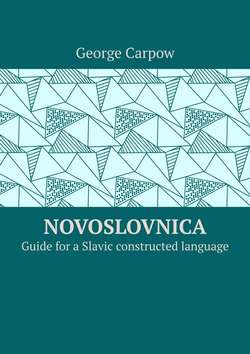Читать книгу Novoslovnica. Guide for a Slavic constructed language - George Carpow - Страница 4
Background
ОглавлениеIt would be right if we start the book with the article 1that was the first on the way to Novoslovnica construction.
The Slavic world has a deep and rich history. The Slavic tribes appeared on the vastness of Europe, and during their history of growth and development they have reached an extraordinary territorial vastness of settlement. We can say that the formed tribes of the Slavs lived on a huge territory according to Europe standards: from the Elbe in the West to the Volga in the East, from the Aegean sea in the South to the Neva river in the North. Further, due to the development of Kievan Rus and the Russian state, the Slavs settled throughout Eastern Europe and Siberia. Despite all the contradictions in politics and strife, the cultural and linguistic component of the Slavs continued to be preserved. Of course, the tribes bordering on other Nations have experienced enormous cultural and linguistic pressure, including Turkic, Roman, Finno-Ugric peoples.
Despite this, the Slavs retained their cultural identity and mentality. So, we can easily understand a person from the same group (Eastern, Western, Southern) and with little difficulty can establish communication with a person from another group of Slavs. This gives us the right to talk about the brotherhood of the Slavic peoples.
Many of the Slavic peoples have sunk into Oblivion, some in very recent times. For example, the Polabian culture left with the language by the middle of the 20th century. However, most of them remained alive, and from our common efforts depends on what will be the future of the Slavs.
From modern Slavic peoples only East Slavic group had relative stability and self-sufficiency. Russian experienced several waves of foreign language intervention – Mongolian, German, French and English, from which he, generally speaking, came out the winner, in many cases enriching and diversifying its vocabulary. At the moment, the English intervention, the strongest since the Tatar-Mongolian yoke, which has withdrawn many native Russian words from our everyday life, has not ended. But Slavs do it, assimilating came, and sometimes returning lost.
The situation is different in other Slavic groups. Not possessing constant sovereign statehood, Western and Eastern Slavs were subject to constant influence other peoples. Thus, the intervention of Turkish language in the South Slavic languages and culture can be correlated with the Tatar-Mongolian yoke for Russia. After liberation from Turks, southern Slavs have become to experience Western influence, and we can to see enough a large number of borrowing from English, French and camping on p. in Bulgarian and Serbian languages.
Throughout its history, Western Slavs were constantly terrorized by the influence of Romanesque languages. So, under the onslaught of the Germans, the Slavs lost their land along the Elbe and retreated to the Oder. Thus, the influence of the Romanesque tribes was also facilitated by the adoption of the Latin alphabet by the languages of the Western Slavs, instead of a possible Glagolitic or Cyrillic. Anyway, Slavs, though, and have undergone numerous impacts on their culture, managed to keep a common language to the present day.
The problem of re-consolidation of the Slavic peoples worried all many centuries ago and attempts were made to implement it. This can be considered the creation of Kievan Rus, the Grand Duchy of Lithuania, the expansion of the Russian Empire to the West, the creation of friendly relations with the Balkans, the creation of the Grand Duchy of Lithuania, Yugoslavia, Czechoslovakia. However, the problem of the impossibility or short-lived nature of this Union arose not because of the establishment of friendly, fraternal relations, but the prevalence of the interests of one nation over all the other members of the Union, which inevitably led to the collapse and failure.
There is a fair idea that the inability to undertake such an Association is not only in the political interests of any country, Yes, undoubtedly, but also in the language of communication, state or Union language. It is impossible to make official all languages and adverbs existing in any district, and declaring one language more important than another we want this or not we turn ourselves to the further collapse of such relations.
The necessity and importance of the creation of the Slavic (pan-Slavic) language was realized in the 16th century, when the first attempts were made to create a common language for all Slavs. However, they did not bring the expected results and sank into oblivion.
Most recent developments of pan-Slavic languages are based on the principle of simplification, minimizing all vocabulary and grammar of languages. For example, these are Slovio and Medžuslovjansky. We believe this is fundamentally wrong, as the new language should not be aimed at the degradation of cultures, but rather to maintain the grandeur and beauty of Slavic culture and identity. Therefore, our principle is not to "Discard all that is foreign", but to "Unite all the best".
If we analyze why the Slavs need a new Slavic language, we can distinguish several positions:
• the need for an additional consolidating factor to unite the policy of the Slavic peoples.
• The need to strengthen mutual understanding and improve the Slavs ' perception of each other.
• Preserve the original richness and beauty of all Slavic languages.
• The impossibility of taking the role of the Slavic language of Russian (and Polish) due to historical reasons.
• Inability to accept the role of the Slavic language of the previous planned projects in full due to objective reasons.
1
G. Carpow, «Братья-славяне, или почему нам нужен новый язык.» http://culturolog.ru/ content/view/2407/6/, 2015. Accessed: 2019—0729.
